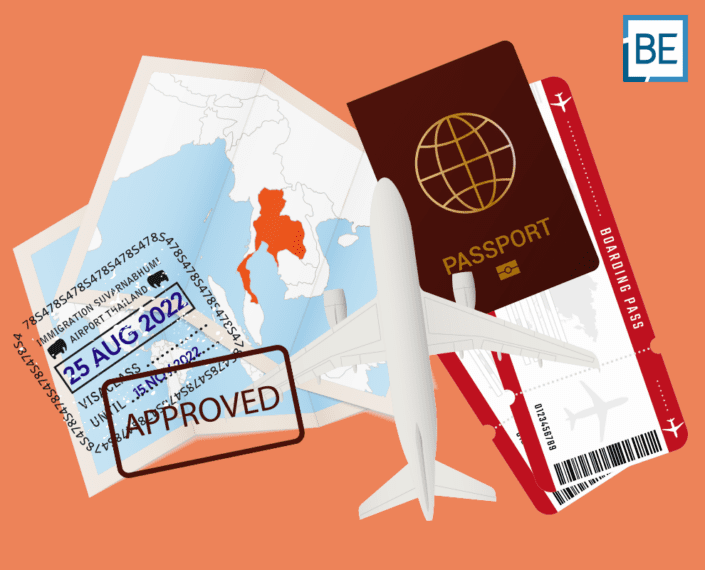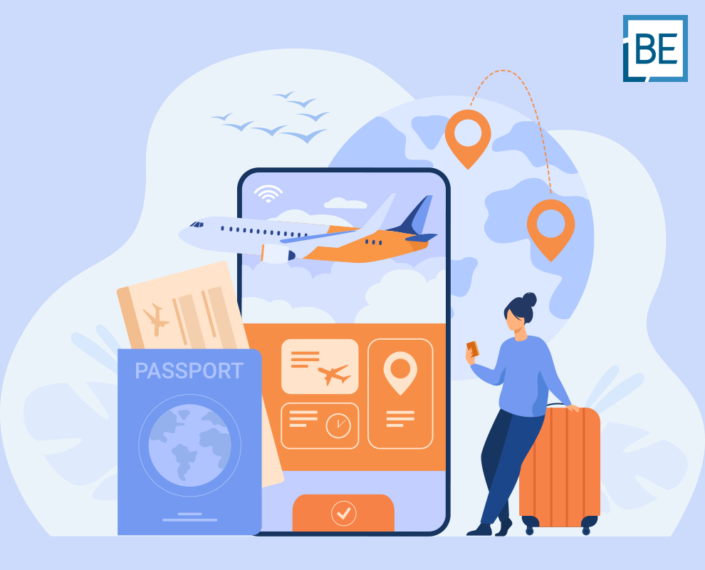Belaws Home ›› Thailand ›› Blog ›› Frequently asked questions about Sponsored Work Permits
Frequently Asked Questions
Sponsored Work Permits in Thailand
If you are considering expanding your business to Thailand, your first consideration may have been setting up a company or a representative office. However, if you want to have foreign employees starting to work as soon as possible or would prefer to test the market before establishing a legal entity, one alternative is to use a Professional Employer Organization (PEO) service, also known as a sponsored work permit.
In this post we will take a look at some of the most commonly asked questions relating to the sponsored work permits.
Key points
- Work permit & visa provided – The PEO company will provide a visa and work permit to the foreign employees.
- Limited investment – no need to set up a company, invest capital and hire local employees.
- Payroll & tax services – The PEO company will handle the payroll and compliance for the personal income tax of the employees.
- Clients still maintain control of their employees at all times.
- PEOs help to ensure full compliance with local laws and regulations.
What are the most commonly asked questions relating to PEO services (sponsored work permits)?
PEO services or sponsored work permits have begun to become a popular option for companies, however, there is often a lot of confusion or misunderstanding relating to how such an arrangement will work. Below you will find some of the most common questions about sponsored work permits answered.
1. What is a sponsored work permit?/Professional Employer Organizations (PEOs)?
In a nutshell, a PEO provides employee management services and administrative assistance. Such services and assistance includes payroll processing, onboarding, recruiting, benefits management, and HR services.
A PEO allows you to register your employees with the relevant authorities using a company in Thailand as the employer of record.
- Establish the payroll protocols, including salary amounts, Thai labour contracts, etc.
- Distribution of the monthly salaries to staff following previously agreed upon protocols.
- Organise and pay all required social insurance contributions, Withholding Tax (WHT) and personal income tax (PIT).
- Redistribute monthly reimbursements.
2. What are the benefits of a sponsored work permit/PEO service?
Opening or expanding your business on a global scale can be a difficult and complex process that can take up a large amount of time and resources. This is especially true for companies who haven’t set up or established their entity in Thailand or are currently stuck in the process of trying to obtain visas and work permits for their foreign staff.
By utilizing a PEO service, companies will receive help complying with international employment laws, onboarding employees and dealing with all necessary accounting and payroll requirements such as salary payments and tax deductions.
PEO services also grant companies far quicker access to the market than would be achieved through setting up a local entity first.
This assistance from a PEO frees up valuable time and resources as well as saving you money in the long term.
3. What types of businesses need a sponsored work permit/PEO service?
PEO services are available and can be utilized by any type of business. Whether it is a two-person office or a manufacturing unit employing many workers, co-employment through a PEO service can be an effective solution.
However, from our experience, PEO services are often used by foreign employees who are looking to start to work as soon as possible or foreign entities would prefer to test the market before establishing a legal entity in Thailand.
4. How do clients using a sponsored work permit/PEO service control their employees?
While the PEO service will officially fulfil all the staffing, payroll and accounting requirements, the actual business owners or clients can still directly supervise or control the employees. The client will determine all job responsibilities, quality standards, wage rates, performance standards, working hours, compliance with rules, and other terms.
5. Do I need to pay tax for my employees when using a PEO service?
More often than not, you will be required to pay tax in the country that you are employing someone in. Your PEO partner will take care of your tax and social security contributions etc.
6. When using a sponsored work permit/PEO service, who deals with the regulatory compliance obligations?
Entities that are looking to expand their businesses to foreign countries, often face the issue of not having the adequate knowledge relating to the local regulatory compliance requirements. A PEO service will efficiently manage all payroll, accounting, taxation, and compliance issues, meaning you don’t have too.
How can Belaws help?
Please click here to find out how Belaws’ experts can help you take advantage of a PEO service.
Our team of immigration experts are on hand to help you make your visa applications as smooth as possible. If you are in need of assistance with regards to staying in Thailand or working in Thailand, you can browse our visa services here.
Belaws understands that the visas in Thailand can often be confusing, so in order to get some more information, why not talk to one of our experts now.
Please note that this article is for information purposes only and does not constitute legal advice.
Our consultations last for a period of up to 1 hour and are conducted by expert Lawyers who are fluent in English, French and Thai.
Consultations can be hosted via WhatsApp or Video Conferencing software for your convenience. A consultation with one of our legal experts is undoubtedly the best way to get all the information you need and answer any questions you may have about your new business or project.
USD 150
Up to 1 hour
Online payment (Paypal or Credit card)
Legal consultation can be conducted in English, French or Thai
Legal consultations are handled by experienced lawyers from the relevant fields of practice
Frequently asked questions
What is sponsor work permit?
In a nutshell, a PEO provides employee management services and administrative assistance. Such services and assistance includes payroll processing, onboarding, recruiting, benefits management, and HR services.
A PEO allows you to register your employees with the relevant authorities using a company in Thailand as the employer of record.
- Establish the payroll protocols, including salary amounts, Thai labour contracts, etc.
- Distribution of the monthly salaries to staff following previously agreed upon protocols.
- Organise and pay all required social insurance contributions, Withholding Tax (WHT) and personal income tax (PIT).
- Redistribute monthly reimbursements.
How much is a work permit in Thailand?
Official fees for a Work Permit in Thailand are 3,000 THB.
How long does it take to get work permit Thailand?
Once you have the correct Visa, the work permit process takes about 10 days to complete.
Are foreigners allowed to work in Thailand?
Yes foreigners can work in Thailand but they require the correct visa and a work permit to do so.
Can I change tourist visa to work permit in Thailand?
Yes it is possible but first the applicant will need to change from a tourist visa to a Non-Immigrant B visa. Once they have the Non-Imm B, they can apply for a Work Permit.
How do I get a 1 year visa for Thailand?
One year Visas are usually available for people who are employed by a Thai company, those married to a Thai national and those who hold a retirement Visa.
How can I live and work in Thailand?
In order to live and work in Thailand you need to have received a job offer from a company who can support your work permit application. Alternatively, you can open your own company in Thailand.
What type of visa is work permit?
A Work Permit is not a Visa, it is a seperate document which allows the holder to legally work in Thailand. In order to get a work permit, holders are required to obtian the relevant visa, in most cases a Non-Immigrant B visa.
How long does a work permit take to process?
Approximately 10 days
How can I get permanent residence in Thailand?
For those wishing to seek permanent residency, they must satisfy one of the following options.
- You have held a Thailand Work Visa and Work Permit for at least three years, and:
- You have an Extension of Stay based on Employment at the time of application
- You have worked at your current company for at least one year at the time of application
- You had a monthly salary of at least 80,000 Baht for two consecutive years or you filed a tax return for an annual income of at least 100,000 Baht for two consecutive years
- You have invested at least 3 Million Baht in a limited or public company in Thailand
- Family: You are a close family member of a Thai citizen (parent, child or spouse)
- Expert: You have at least a BA Degree and are employed in a position in which you have to work in for at least three consecutive years.
How can I stay in Thailand for a year?
One year Visas are usually available for people who are employed by a Thai company, those married to a Thai national and those who hold a retirement Visa.
Can foreigners become Thai citizens?
Yes, it is possible for foreigners to be able to take Thai citizenship, however, there are strict guidelines and requirements which must be satisfied.
How long can foreigners live in Thailand?
This depends on which Visa the foreigner holds. Holders of Non-Immigrant Visas based on Work, Marriage or Retirement can apply for yearly extensions of stay which can be an unlimitied amount of times (as long as they still meet the application requirements). There are also Visas which allow longer periods of stay such as the Thailand Elite Visa as well.
How much money do I need to move to Thailand?
The answer to this will depend entirely on your lifestyle, where you choose to live and your expectations.
Related articles
Subscribe today
Subscribe today
To our newsletter for all the latest legal news
in South East Asia, Belaws updates and
special promotions on our services.
To our newsletter today for all the latest legal news in South East Asia,
Belaws updates and special promotions on our services.







